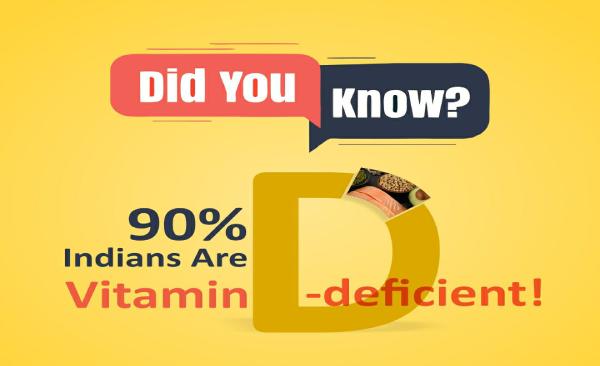When someone says vitamin D, as a 90’s kid, my first thought goes back to Calcium Sandoz and its happy-puppy bottles. Although I loved collecting them for the container more than the health benefits, it was probably the first time I came across the term “Vitamin D.”
Vitamin D is an essential nutrient, and our body produces it as a response to sun exposure and through some dietary intake. It is important for bones because it helps absorb calcium and phosphorus. Your body can run low on vitamin D due to many reasons. Once you start noticing certain signs and symptoms, take it as a wake up call to get tested.
Causes of Vitamin D Deficiency:
You become deficient in vitamin D for different reasons as follows:
- You don’t get recommended levels of vitamin D from your diet.
- You don’t get enough sunlight.
- Your liver/kidneys cannot convert vitamin D to its active form.
- Your digestive tract cannot adequately absorb vitamin D.
- You are on medication that affects the body’s ability to convert/absorb vitamin D.
- Your skin has a dark complexion.
- You are obese or overweight.
- You are a smoker.
Book Vitamin Profile and Get 20% Off
Common Symptoms of Vitamin D Deficiency:
- Aching muscles: Vitamin D is essential for keeping your muscles healthy. Without it, your muscles become weak and achy.
- Painful bones: Vitamin D helps your body absorb calcium, and calcium is the building block of your bones. Without it, your bones get weak, lose strength and feel painful.
- Fatigue: Vitamin D is essential for cell metabolism and bone strength. Without it, you may feel tired and low on energy constantly. Performing routine activities can also feel like taking on a challenge because of depleted energy levels.
- Binge eating: When you’re running low on vitamin D, no matter how much you eat, you are not likely to feel full in your stomach. Ultimately, you’ll find yourself overeating or binge eating.
- Weight gain: Needless to say, overeating is going to land you on the doorstep of weight gain and obesity. Vitamin D keeps your metabolism stable. Without it, your metabolism slows down, and you may find it difficult to lose weight.
- Low moods: Vitamin D boosts your happy hormone serotonin, which keeps your mood stable. Without vitamin D, you may find it difficult to be cheery and have a healthy attitude towards life. You may experience frequent mood swings.
- Losing hair: Vitamin D is essential for the hair growth cycle. It stimulates new and old hair follicles. Vitamin D deficiency causes impaired hair growth and dull damaged hair.
- Reduced brain functions: One sign that you have vitamin D deficiency is that you’ll find it difficult to remember or think. This is because vitamin D keeps your brain healthy, and its lack would definitely not bring desirable effects.
Testing To Detect Vitamin D Deficiency
Blood tests are the best way to understand vitamin D levels in the body. They also help screen and monitor bone disorders. Three important blood tests to evaluate vitamin D levels are:
- 25-OH Vitamin D (total) test: to measure the total amount of Vitamin D (active & inactive) in the body
- Vitamin D 1,25 – Dihydroxy test: to measure only the active form of Vitamin D present in the blood
- Vitamin D3 test: to confirm vitamin D deficiency
An apple a day won’t always keep the doctor away. Sometimes, you need an appropriate diet rich in vitamins, minerals and all essential nutrients. A short walk outside under the sun can also suffice. Utilize a natural source of vitamin D as much as you can & stay healthy.








